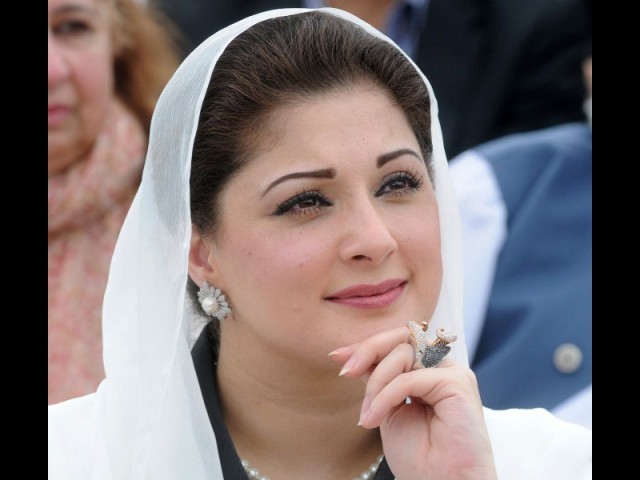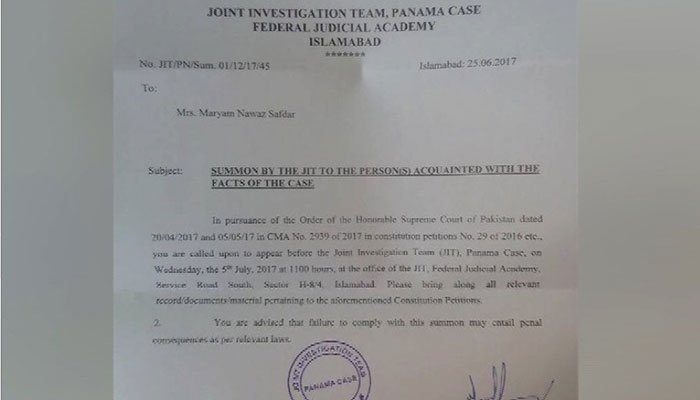The Panama Papers case Joint Investigation Team (JIT) has summoned Prime Minister Nawaz Sharif's daughter Maryam Nawaz on July 5. According to sources, the premier's elder son Hussain Nawaz has been summoned on July 4 and his younger brother, Hasan, on July 3. Hussain has appeared five times before the high-profile probe team whereas Hasan has been summoned twice already. The summons, dated June 25, 2017, has also asked the respondent to bring forth relevant documents related to the Sharif family's financial assets. The JIT, which resumed work today after taking a day's break for Eid on Monday, has asked all three siblings to appear before it at 11am on their respective call dates. The JIT works out of the Federal Judicial Academy in Islamabad.

A family affair
Maryam will become the sixth member of the Sharif family to appear before the high-profile probe team, formed on May 6 in light of the Supreme Court's April 20 judgment in the Panama Papers case. Prime Minister Nawaz Sharif appeared before the JIT on June 15. Following his questioning, the premier addressed the media while reading from a written speech and claimed that every penny his family has earned is accounted for. "All documents related to my assets, though already with the Supreme Court, have been provided to the JIT now," said Sharif. The premier stressed that the assets under question are his family’s private assets and have nothing to do with public money. The premier's brother, Punjab Chief Minister Shehbaz Sharif, also appeared before the JIT on June 17. Speaking to the media, he said he had been summoned 'as someone acquainted with the facts of Panama case'. He told journalists that the prime minister's actions and his own clearly show the difference between how much respect the judiciary is given by military dictators and elected officials.
On June 9, Hussain made his fifth and what he thought could be his last appearance before the JIT. Talking to the media after his questioning, he said no government or court can act on the basis of mere suspicions. “Looking at the type of questions asked, I don’t think I will be summoned again by the JIT in near future,” he said. A day earlier, on June 8, Hasan made his second appearance before the JIT. He did not speak to the media before or after his questioning. Speaking to the media after Hassan went inside, Prime Minister's Political Secretary Asif Kirmani lamented the treatment being meted out to the prime minister’s family. Moreover, the last member of the Sharif family to be questioned by the JIT was MNA Capt (retd) Muhammad Safdar, Maryam's husband. On June 24, speaking to the media after his five-hour grilling, Safdar said “[The] Panama case is not against Nawaz Sharif – it is against the Nawaz Sharif who made Pakistan a nuclear power, the one who made motorways, steered Pakistan away from darkness”.

The premier's son-in-law questioned why no one was questioning the people who have palaces in Surrey. He also called on Pakistan Tehreek-e-Insaf Chairman Imran Khan to distance himself from ‘conspiracies against Pakistan’. The Panama case was not accountability of Nawaz Sharif but rather of the two-nation theory, he claimed. Moreover, on Monday, it was reported that the JIT has summoned once more the prime minister's relative, Tariq Shafi, to appear before it. The investigation team issued summons to the premier's cousin, Tariq Shafi, to appear before it at noon on July 2. The summons, signed by the JIT's member from the National Accountability Bureau, Irfan Mangi, was issued on June 23, Geo News learnt. Shafi has twice appeared before the team of investigators on May 16 and 17. He had earlier submitted an affidavit in the Supreme Court stating that he was part of all transactions relating to sale of Dubai properties owned by Mian Sharif — father of Nawaz Sharif — and transfer of that money to Qatar.
Countdown till July 10
On Thursday, the special bench of the Supreme Court overseeing the JIT’s work directed the investigators to submit their final report on July 10. The direction was given after the JIT submitted its third and second-last progress report to the bench, headed by Justice Ejaz Afzal Khan and comprising Justice Ijazul Ahsan and Justice Azmat Saeed Sheikh. On June 7, the JIT had submitted its midterm report before the special bench. The bench had expressed satisfaction with the JIT’s progress in the probe, and reiterated that the investigation has to be completed within the stipulated 60-day period. Since then, the case was marred in further controversies after Hussain accused the JIT of deliberately leaking his interrogation picture, and the JIT submitted a report in the court accusing several official quarters, including the PM House, of impeding the probe. On June 20, the special bench dismissed Hussain’s petition asking for an end to the recording of the JIT’s sessions. The judges observed that the videos will not be submitted in court for evidence but will be used to maintain the accuracy of the sessions’ transcripts. At the same hearing, the judges gave the attorney general more time to submit the government’s response to the JIT’s accusations of creating hurdles in its probe.